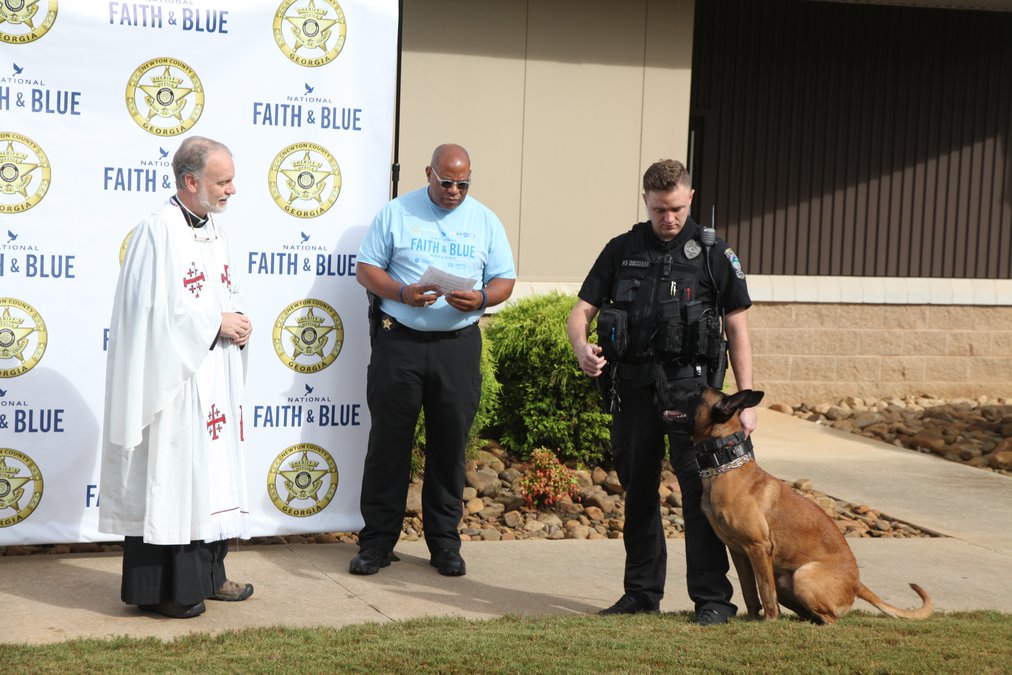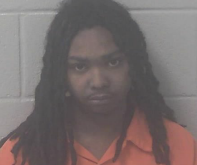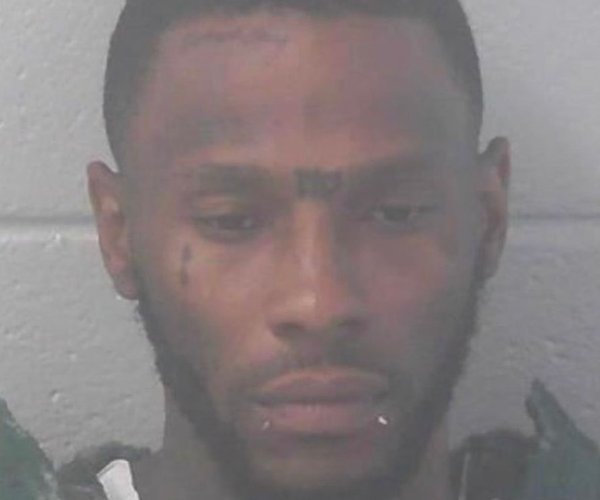COVINGTON, Ga. — Faith and Blue Weekend featured a variety of events that touched on the theme of bringing law enforcement and the public closer through the faith community.
A bicycle ride, free COVID-19 shots, car and bike show, a blessing of police dogs, and a virtual roundtable on community policing were among the activities featured during the three-day Newton County observance of the national event.
The Rev. M. Edwin Beckham of the Church of the Good Shepherd Episcopal Church in Covington blessed K-9 officers from Newton County and Conyers during a ceremony Friday at the sheriff's office's Alcovy Road headquarters.
Sheriff Ezell Brown also hosted a virtual discussion Friday with faith leaders and city police chiefs Stacey Cotton of Covington, Jason Cripps of Porterdale, and David Harvey of Oxford.
Among the topics was community policing development, which all said they worked to do in ways based on such factors as manpower and time constraints.
Cotton said his department often deals with those who have "lost their way" and the faith community can help his officers in their work.
"If we can bring in the faith community to help us do our job — we can't police our way out of problems. We have to find solutions as a community, as people, as humans define humanity.
"And I think that's Faith and Blue's message ... that we need each other and we need civil order in our society to be successful and we need the Lord in our lives," Cotton said.
He said there are many societal "undercurrents" involved both locally and nationally that affect law enforcement agencies' work. Police agencies are conducting community outreach programs but need other local organizations to be community-oriented as well, Cotton said.
The Rev. Willie Davis of Murray Memorial CME Church in Covington, said he was "in a unique situation" because he serves as a pastor in the same community where he grew up and served as an officer with the Covington Police Department.
"One of the things where we have not had issues to the magnitude that some other places have had is because in the past we've gotten engaged in the community through programs to try to engage the community, through being there," he said.
"Those were the past. In the present we're dealing with a whole ... new generation. We have to be more engaged in the community — not just law enforcement but the faith-based community.
"In Covington, I've always said Newton County almost has a church on every corner. With crime, if we go and stand on some corner sometime instead of in the pulpits and sitting in the pews, maybe we can take our streets and our communities back ... and start having programs in our communities that's relevant. I think that we could be a model for other communities."
Brown said the sheriff's office is engaged in community outreach programs like school supply giveaways, a Random Acts of Kindness initiative, and the Residential Substance Abuse Treatment program for jail inmates.
He said a deputy formerly had the time to stop and chat with farmers or other residents in the 1970s when he began working with the sheriff's office and the unincorporated part of the county was primarily rural.
Now, many parts of the sheriff's office's jurisdiction are developed with residential neighborhoods and the population has more than doubled. A deputy must move from call to call quickly with only three to five minutes to tell a crime victim "law enforcement is doing everything they can do," Brown said.
"That three to five minutes (with) that particular person, that is a real, live moment regardless of whether the person is complaining about a cat up a tree or or the next door neighbor doing something inappropriate," Brown said.
Cotton said his department's calls for service have more than doubled in recent years despite the city's population not increasing past 14,000 since the 1980s. The number of calls increased from 12,000 to about 35,000 annually in the same time period, he said.
"The public needs to understand it's not like it was back in the old days when you can stop and talk with your neighbor," he said. "We're always behind the eight-ball trying to play catch-up and get enough people to do the job that we have."
Harvey said he dealt with the same time constraints as Newton County deputies when he worked as a training officer with DeKalb County Police Department.
However, he said the relatively small number of calls the Oxford Police Department receives allows Harvey and other officers to "stop and visit" with adults. They also interact with children in such ways as giving out free coloring books, he said.
Cripps said Porterdale Police organize or participate in such activities as an annual kickball tournament and the city's annual Christmas parade.
They also discussed strategies their departments were using to strengthen relationships between the police and the various communities in their jurisdictions, including minorities.
Cotton said his department has tried not to distinguish between Black, brown and white communities.
"Our community is really diversified. There are people from all around the world and people from all around this country who are moving here," he said.
"Our strategy doesn't necessarily need to be about minorities or ... communities. I think that by the diversity of our cultures and people's opinions — everybody should count. At least that's our philosophy, to try to approach it from the diversity so that you don't just have a template that one size fits all," Cotton said.
"We try to find out and understand the cultural differences that we all have and ... help them with their area."
Cripps said he has directed his officers to treat those with which they encounter "with empathy" and "human decency." That includes such methods as not placing an offender on the ground if restraints are required, he said.
Harvey said he felt "really sad" when he would approach a neighborhood in a patrol vehicle as a DeKalb Police officer. Children in the area would "run away" from officers because they had been taught police were not there to protect them, Harvey said.
"That's what's being put in their heads," he said.







